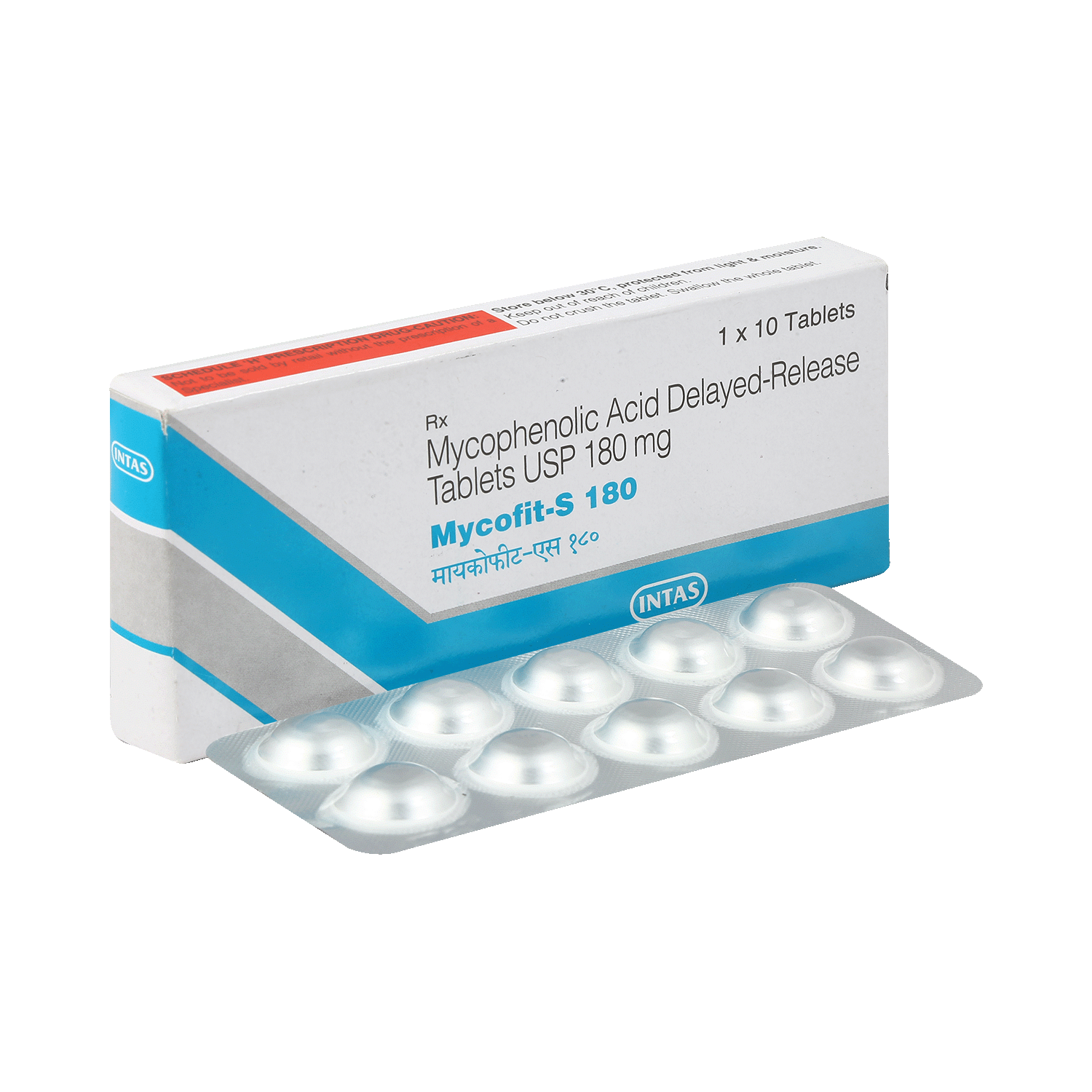





Mycofit-S 180mg Tablet DR
Manufacturer
Intas Pharmaceuticals Ltd
Salt Composition
Mycophenolate sodium (180mg)
Key Information
Short Description
Mycofit-S 180mg Tablet DR is an immunosuppressant used to prevent organ rejection after a transplant, such as kidney, heart, or liver.
Dosage Form
Tablet DR
Introduction
Mycofit-S 180mg Tablet DR is an immunosuppressant used to prevent organ rejection after a transplant. It works by weakening your body's immune system, so it does not attack the transplanted organ. The amount of Mycofit-S 180mg Tablet DR you take depends on the type of transplant you have. Follow your doctor's instructions on this. This medicine may be taken with or without food. Swallow it as a whole, do not crush, chew, break, or open them. Take the medicine regularly to get the most benefit and keep taking it even if you feel well. If you stop taking it, you may increase the chances of rejecting your transplanted organ.
Directions for Use
Take this medicine in the dose and duration as advised by your doctor. Swallow it as a whole. Do not chew, crush, or break it. Mycofit-S 180mg Tablet DR may be taken with or without food, but it is better to take it at a fixed time.
Safety Information
Side Effects
Nausea Vomiting Diarrhea Stomach pain Headache High blood pressure Changes in the number of white blood cells
Alcohol Warning
Consuming alcohol with Mycofit-S 180mg Tablet DR does not cause any harmful side effects.
Breastfeeding Warning
Mycofit-S 180mg Tablet DR is unsafe to use during breastfeeding. Data suggests that the drug may cause toxicity to the baby.
Pregnancy Warning
Mycofit-S 180mg Tablet DR is unsafe to use during pregnancy as there is definite evidence of risk to the developing baby. However, the doctor may rarely prescribe it in some life-threatening situations if the benefits are more than the potential risks. Please consult your doctor.
How it works
Mycofit-S 180mg Tablet DR is an immunosuppressant. It reduces the action of body's own defense system (the immune system) and prevents rejection of the transplanted organ.
Quick Tips
Take it with food to minimize possible side effects like nausea and stomach pain. Avoid contact with people who have an infection and consult your doctor immediately if you develop a sore throat, high temperature, or any other signs of infections. Protect yourself from direct sunlight by wearing protective clothing and applying a sunscreen with a high sun protection factor (SPF). Your doctor may get regular blood tests done to monitor the levels of blood cells in your blood. Inform your doctor if you experience symptoms such as unexplained bruising or bleeding, sore throat, mouth ulcers, or fever.
Frequently asked questions
What is Mycofit-S 180mg Tablet DR, and why has my doctor given it to me after a kidney transplant?
Mycofit-S 180mg Tablet DR is an immunosuppressant medication that helps your body accept the donor kidney by suppressing or weakening your immune system. This allows your body to tolerate the transplanted organ and reduces the risk of rejection.
Can Mycofit-S 180mg Tablet DR increase my chances of cancer?
Yes, Mycofit-S 180mg Tablet DR may increase your risk of certain cancers, such as skin cancer and lymphoma. To minimize this risk, avoid prolonged exposure to sunlight, wear protective clothing, and apply sunscreen. If you notice any unusual skin changes or sores, contact your doctor immediately.
Is Mycofit-S 180mg Tablet DR a steroid or chemotherapy medication? Can it cause hair loss?
No, Mycofit-S 180mg Tablet DR is neither a steroid nor a chemotherapy medication. It is an immunosuppressant that helps your body accept the donor kidney. Hair loss is a possible side effect of Mycofit-S 180mg Tablet DR.
Do I need any special tests while taking Mycofit-S 180mg Tablet DR?
Yes, your doctor will ask you to have blood tests before and during treatment to monitor the effectiveness of the medication and detect any potential side effects. Regular blood tests are necessary to ensure your body is responding well to the medication.
Why has my doctor advised me to avoid someone with chicken pox or shingles?
As Mycofit-S 180mg Tablet DR weakens your immune system, you may be more susceptible to infections like chicken pox and shingles. To minimize this risk, maintain a safe distance from anyone who is infected and contact your doctor immediately if you develop symptoms.
What precautions should a female take while taking Mycofit-S 180mg Tablet DR?
Do not become pregnant or plan a pregnancy while taking Mycofit-S 180mg Tablet DR, as it can cause miscarriage and birth defects. Use two forms of birth control together for 4 weeks before starting treatment, during treatment, and for 6 weeks after stopping the medication.
What precautions should a male take while taking Mycofit-S 180mg Tablet DR?
Either the man or his partner should use reliable contraception during treatment and for 90 days after the treatment. Men should not donate semen during this period to avoid any potential risks.


